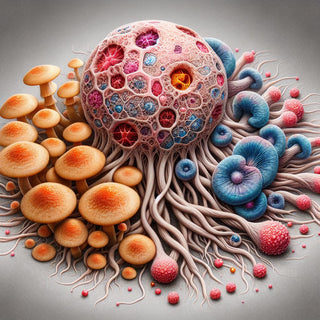In recent years, the potential role of mushroom supplements in cancer treatment has garnered significant attention. While mushrooms have long been valued for their culinary and medicinal properties in various cultures, contemporary research is shedding light on their potential as adjunctive therapies in cancer treatment. In this comprehensive article, we delve into the current understanding of how mushrooms may support cancer care, from immune modulation to psycho-social benefits, and beyond.
Mushrooms as Adjunctive Cancer Therapy: What Does the Research Say?
Numerous studies and clinical trials have investigated the role of medicinal mushrooms as adjunctive therapies in cancer treatment. While more research is needed to fully understand their mechanisms and efficacy, promising findings have emerged. For instance, a meta-analysis published in the journal Cancer Medicine in 2022 suggested that certain mushroom extracts may enhance the efficacy of conventional cancer therapies and improve patients' quality of life.
Immune Modulation from Mushroom Supplements and Their Role in Fighting Cancer
One of the key mechanisms through which medicinal mushrooms may exert their anti-cancer effects is immune modulation. Compounds like polysaccharides and triterpenoids found in mushrooms have been shown to enhance immune function, potentially aiding in the body's natural defence against cancer cells. These compounds may stimulate immune cells, such as T cells and natural killer cells, and modulate cytokine production, thereby contributing to the suppression of tumour growth and metastasis.
Mounting evidence suggests that medicinal mushrooms hold promise as adjunctive therapies in cancer treatment, owing in part to their ability to modulate the immune system. Compounds found in mushrooms, particularly polysaccharides and triterpenoids, have garnered attention for their immunomodulatory effects, which may bolster the body's natural defence mechanisms against cancer cells.
Research Findings on the Role of Mushrooms in Cancer Treatment
Numerous studies and clinical trials have explored the potential of mushroom supplements as adjunctive therapies in cancer treatment, with promising results.
For instance, research on Reishi mushrooms (Ganoderma lucidum) has demonstrated their ability to enhance immune function and inhibit tumour growth. Beta-glucans and triterpenoids present in Reishi mushrooms have been identified as bioactive compounds responsible for these effects. Similarly, studies on Turkey Tail mushrooms (Trametes versicolor) have revealed their potential to stimulate immune cell production and modulate immune responses, making them promising candidates for cancer immunotherapy.
Mechanisms of Action: Interaction with Cancer Cells
Compounds like polysaccharides and triterpenoids found in medicinal mushrooms are thought to interact with cancer cells through various mechanisms, including apoptosis induction and angiogenesis inhibition.
Apoptosis Induction
Polysaccharides and triterpenoids have been shown to induce apoptosis, or programmed cell death, in cancer cells. By triggering this process, mushrooms can help eliminate abnormal or damaged cells, thereby impeding tumour growth and progression.
Angiogenesis Inhibition
Another key mechanism through which mushroom supplements may combat cancer is by inhibiting angiogenesis, the process by which new blood vessels form to supply tumours with nutrients and oxygen. Compounds found in medicinal mushrooms have been found to interfere with angiogenesis, starving tumours of the resources they need to thrive and metastasize.
Cell Cycle Arrest
Compounds found in mushroom supplements have demonstrated the ability to induce cell cycle arrest in cancer cells, a crucial mechanism for controlling their proliferation. By targeting specific checkpoints in the cell cycle, such as the G1, S, or G2 phases, mushrooms can disrupt the normal progression of cell division and halt the uncontrolled growth of tumours. This process effectively prevents cancer cells from replicating and proliferating further, thereby impeding tumour growth and progression. By inducing cell cycle arrest, medicialmushrooms offer a strategic approach to slowing down the expansion of cancerous tissues and limiting the spread of the disease throughout the body.
Antimetastatic Effects
Metastasis, the spread of cancer cells from the primary tumour to distant sites in the body, is a complex process involving multiple steps, including cell adhesion, migration, invasion, and colonisation. Compounds found in medicinal mushrooms have demonstrated remarkable antimetastatic properties by interfering with various stages of the metastatic cascade. For instance, they may inhibit the expression of adhesion molecules involved in cancer cell attachment to the extracellular matrix or endothelial cells lining blood vessels. Additionally, mushrooms can suppress the invasive potential of cancer cells by modulating signalling pathways that regulate cell motility and invasion. By disrupting key events in the metastatic process, mushrooms effectively hinder the dissemination of cancer cells and reduce the risk of secondary tumour formation in distant organs.
Induction of Autophagy
Autophagy is a highly regulated cellular process involved in the degradation and recycling of damaged organelles and proteins, promoting cellular homeostasis and survival under stress conditions. Dysregulation of autophagy has been implicated in cancer development and progression, with both excessive and deficient autophagic activity contributing to tumour growth and metastasis. Compounds found in mushrooms have been shown to induce autophagy in cancer cells, leading to their self-destruction and inhibition of tumour growth. By promoting autophagic cell death, mushrooms provide a mechanism for eliminating cancer cells and suppressing tumour progression while maintaining cellular homeostasis.
Modulation of Epigenetic Regulation
Epigenetic modifications, such as DNA methylation and histone modifications, play a crucial role in regulating gene expression and cellular function. Dysregulation of epigenetic processes is a hallmark of cancer, contributing to aberrant gene expression patterns and tumour development. Compounds found in mushrooms have been found to modulate epigenetic regulation by influencing the activity of enzymes involved in these processes, such as DNA methyltransferases and histone deacetylases. By restoring normal epigenetic patterns, mushrooms can reprogram cancer cells and inhibit their growth and proliferation. This epigenetic modulation offers a promising avenue for cancer therapy, as it provides a means of targeting the underlying molecular alterations driving tumorigenesis.
Enhancement of Antioxidant Defense
Cancer cells often exhibit increased levels of oxidative stress due to elevated metabolic activity and mitochondrial dysfunction. Oxidative stress contributes to DNA damage, genomic instability, and cancer progression. Compounds found in mushrooms, including phenolic compounds and antioxidants like selenium and ergothioneine, can enhance the antioxidant defence system of cells. By scavenging free radicals and reducing oxidative stress, mushrooms protect cells from DNA damage and inhibit carcinogenesis. This enhancement of antioxidant defence provides a crucial mechanism for counteracting the pro-oxidant environment within cancer cells and suppressing tumour growth. Moreover, mushrooms' antioxidant properties may also mitigate the adverse effects of conventional cancer therapies, such as chemotherapy and radiation, which can induce oxidative stress in normal tissues.
A Snapshot on the Best Mushrooms for Certain Cancers
|
Cancer Type |
Recommended Mushroom |
|
Breast Cancer |
Reishi, Turkey Tail, Maitake |
|
Prostate Cancer |
Shiitake, Cordyceps, Chaga |
|
Lung Cancer |
Cordyceps, Turkey Tail |
|
Colon Cancer |
Maitake, Shiitake, Reishi |
|
Leukaemia |
Chaga, Reishi, Cordyceps |
Reishi (Ganoderma lucidum)
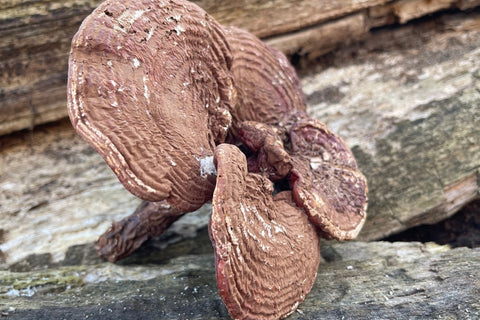
Active Compounds:
Reishi mushrooms contain a variety of bioactive compounds, including beta-glucans, triterpenoids (such as ganoderic acids), polysaccharides, and sterols.
Recommended for:
Breast cancer, colon cancer, leukaemia.
Mechanisms
Beta-glucans and triterpenoids found in Reishi mushrooms have been shown to enhance immune function by activating various immune cells, such as T cells and natural killer cells. Additionally, polysaccharides present in Reishi mushrooms have demonstrated anti-inflammatory and antioxidant properties, which may contribute to their potential anti-cancer effects.
Studies suggest that these compounds may inhibit tumour cell proliferation, induce apoptosis (programmed cell death), and suppress angiogenesis (the formation of new blood vessels to support tumour growth), thereby impeding cancer progression.
Learn more about the benefits of Reishi here.
Turkey Tail (Trametes versicolor)
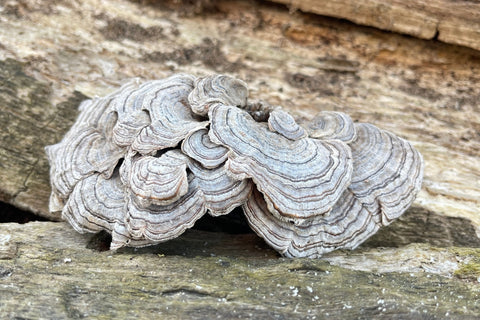
Active Compounds:
Turkey Tail mushrooms are rich in polysaccharides (such as beta-glucans and PSP) and phenolic compounds.
Recommended for:
Breast cancer, lung cancer.
Mechanisms
The polysaccharides and phenolic compounds in Turkey Tail mushrooms have been extensively studied for their immunomodulatory effects. They have been shown to enhance the activity of immune cells, including macrophages, dendritic cells, and T cells, and promote the production of cytokines involved in immune regulation.
By stimulating the immune system, Turkey Tail mushrooms may help the body recognize and eliminate cancer cells. Additionally, the antioxidant properties of Turkey Tail mushrooms may reduce oxidative stress and inflammation, which are implicated in cancer development and progression.
Learn more about the benefits of Turkey Tail here.
Maitake (Grifola frondosa)
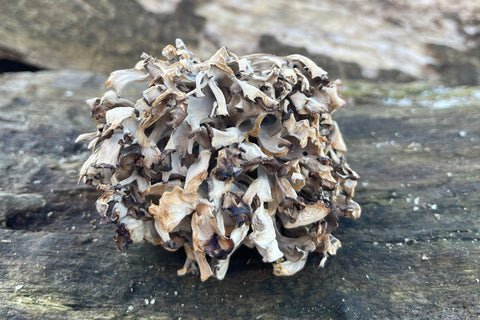
Active Compounds:
Maitake mushrooms contain various bioactive compounds, including beta-glucans, polysaccharides, and ergosterol.
Recommended for:
Breast cancer, colon cancer.
Mechanisms
Beta-glucans and polysaccharides found in Maitake mushrooms have been shown to modulate immune function by activating immune cells and promoting the production of cytokines involved in immune responses.
Additionally, Maitake mushrooms possess antitumor properties and have shown the ability to inhibit tumour cell proliferation and induce apoptosis. The ergosterol content in Maitake mushrooms may also contribute to their anti-cancer effects by exerting cytotoxic effects on cancer cells.
Learn more about the benefits of Maitake here.
Shiitake (Lentinula edodes)
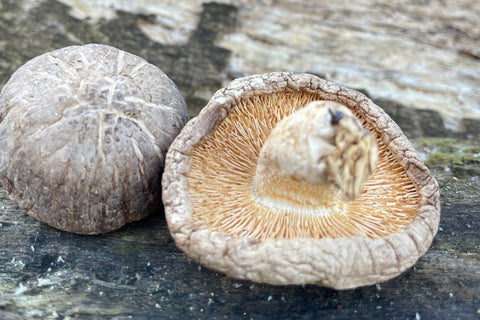
Active Compounds:
Shiitake mushrooms contain beta-glucans (such as lentinan), polysaccharides, ergosterol, and various bioactive peptides.
Recommended for:
Prostate cancer, colon cancer.
Mechanisms
Lentinan, a beta-glucan found in Shiitake mushrooms, has been extensively studied for its immunomodulatory properties. It enhances the activity of immune cells, such as macrophages and natural killer cells, and stimulates the production of cytokines involved in immune regulation.
Additionally, Shiitake mushrooms possess antitumor effects attributed to their ability to inhibit tumour cell proliferation, induce apoptosis, and suppress angiogenesis. The presence of bioactive peptides in Shiitake mushrooms may also contribute to their anti-cancer activity by modulating signalling pathways involved in cell growth and survival.
Learn more about the benefits of Shiitake here.
Cordyceps (Cordyceps militaris/ sinensis)
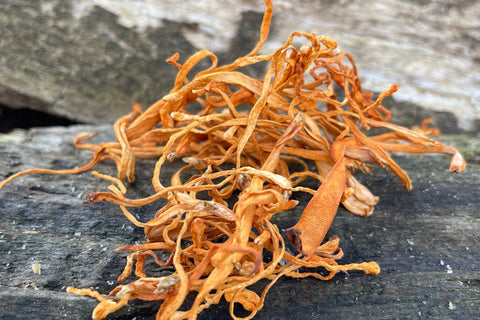
Active Compounds:
Cordyceps mushrooms contain cordycepin, polysaccharides, adenosine, and various bioactive compounds.
Recommended for:
Prostate cancer, lung cancer, leukaemia.
Mechanisms
Cordyceps mushrooms exert their anti-cancer effects through multiple mechanisms. Cordycepin, a nucleoside analog found in Cordyceps mushrooms, has been shown to inhibit cancer cell proliferation by interfering with nucleic acid synthesis and inducing apoptosis.
Polysaccharides present in Cordyceps mushrooms possess immunomodulatory properties and can enhance the activity of immune cells, such as T cells and natural killer cells, thereby boosting the body's defence against cancer cells. Additionally, Cordyceps mushrooms may improve respiratory function and enhance oxygen utilisation, which could be beneficial for lung cancer patients.
Learn more about the benefits of Cordyceps here.
Chaga (Inonotus obliquus)

Active Compounds:
Chaga mushrooms are rich in polysaccharides (such as beta-glucans), betulinic acid, melanin, and antioxidants.
Recommended for:
Prostate cancer, leukaemia.
Mechanisms
The polysaccharides and betulinic acid in Chaga mushrooms possess immunomodulatory and antitumor properties. They stimulate immune cell activity and cytokine production, which helps in the recognition and elimination of cancer cells.
Additionally, Chaga mushrooms exhibit antioxidant and anti-inflammatory effects, which may protect cells from oxidative damage and reduce inflammation associated with cancer progression. The melanin content in Chaga mushrooms has also been suggested to have antitumor effects by interfering with cancer cell proliferation and inducing apoptosis.
Learn more about the benefits of Chaga here.
Psycho-Social Benefits of Mushrooms for Cancer Patients
Coping with a cancer diagnosis and undergoing treatment is a multifaceted journey that can profoundly impact an individual's mental and emotional well-being. Beyond the physiological effects, emerging research indicates that incorporating mushrooms into the diet may offer significant psycho-social benefits for cancer patients. Here's a comprehensive exploration of how mushroom consumption might positively influence mood, cognitive function, and overall quality of life for those navigating the challenges of cancer treatment:
Improvements in Mood and Emotional Well-being
The psychological toll of a cancer diagnosis and treatment regimen can manifest in various ways, including heightened levels of stress, anxiety, and depression. Fortunately, mushrooms contain bioactive compounds such as beta-glucans and polysaccharides that possess neuroprotective properties. These compounds have been shown to influence neurotransmitter activity, particularly serotonin and dopamine, which play pivotal roles in regulating mood and emotions.
Research suggests that by promoting the release of these neurotransmitters and modulating their activity, mushroom consumption may contribute to a more balanced emotional state for cancer patients. By experiencing improvements in mood and a reduction in feelings of anxiety and depression, individuals undergoing treatment may find greater resilience and emotional well-being in the face of their diagnosis.
Enhancements in Cognitive Function
Cancer treatments such as chemotherapy and radiation therapy can sometimes lead to cognitive side effects commonly referred to as "chemo brain" or "cancer-related cognitive impairment." These symptoms may include memory difficulties, challenges with concentration, and mental fog, all of which can significantly impact daily functioning and quality of life.
The neuroprotective properties of compounds, found in mushrooms such as lion's mane, offer promise in mitigating these cognitive challenges. By supporting brain health and function, mushroom consumption may help to maintain cognitive clarity, mental sharpness, and overall cognitive function throughout the course of treatment. This enhancement in cognitive function can empower cancer patients to better manage the demands of their treatment and maintain a sense of cognitive vitality and independence.
Enhanced Sense of Empowerment and Control
In addition to the biochemical effects, the act of incorporating mushrooms into one's diet can have profound psychosocial implications for cancer patients. Adopting a balanced diet that includes nutrient-rich foods like mushrooms can provide individuals with a sense of empowerment and control over their health and well-being.
For cancer patients, who often grapple with feelings of uncertainty and a loss of control over their bodies and lives during treatment, making informed dietary choices can be profoundly empowering. By actively participating in their own care, cancer patients may experience a renewed sense of agency and resilience in the face of their diagnosis and treatment journey.
While the psycho-social benefits of mushroom consumption for cancer patients are still being elucidated, emerging evidence underscores its potential to positively impact mood, cognitive function, and overall quality of life. By influencing neurotransmitter activity, enhancing cognitive function, and fostering a sense of empowerment and control, mushrooms offer a holistic approach to supporting the mental and emotional well-being of individuals navigating the complexities of cancer treatment.
As research in this area continues to evolve, further exploration into the psycho-social effects of mushroom consumption holds promise for enhancing the holistic care and support of cancer patients. By recognizing and harnessing the psycho-social benefits of mushrooms, healthcare providers can offer comprehensive and personalised strategies to enhance the well-being of individuals affected by cancer.
Antioxidants in Mushrooms: A Double-Edged Sword in Cancer Prevention and Treatment?
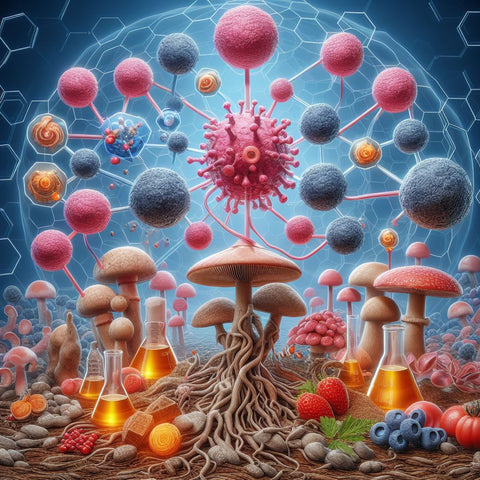
Mushrooms are rich in antioxidants, compounds that help neutralise harmful free radicals in the body. While antioxidants are generally considered beneficial for cancer prevention due to their ability to reduce oxidative stress and inflammation, their role in cancer treatment is more complex. Some studies suggest that high doses of antioxidants may interfere with the efficacy of certain cancer therapies, such as chemotherapy and radiation. Therefore, it is important for cancer patients to discuss their mushroom consumption and antioxidant intake with their healthcare providers.
Role of Antioxidants in Cancer Prevention
Antioxidants found in mushrooms play a significant role in cancer prevention by neutralising harmful free radicals and reducing oxidative stress and inflammation in the body. Free radicals are unstable molecules that can damage cells and DNA, leading to the development of cancer and other chronic diseases. By scavenging free radicals, antioxidants help protect cells from oxidative damage and maintain cellular health, thereby lowering the risk of cancer initiation and progression.
Mushrooms are rich sources of various antioxidants, including selenium, ergothioneine, and glutathione, among others. These compounds have been shown to exhibit potent antioxidant activity, effectively combating oxidative stress and supporting overall health. For example, selenium is a trace mineral that acts as a cofactor for antioxidant enzymes, while ergothioneine is a unique antioxidant with cytoprotective properties, and glutathione is a powerful antioxidant that plays a crucial role in cellular detoxification and immune function.
Evidence Supporting Mushroom Consumption and Reduced Cancer Risk
Numerous epidemiological studies have demonstrated associations between mushroom consumption and a reduced risk of certain cancers. Additionally, laboratory studies have provided insights into the mechanisms by which mushroom-derived antioxidants may exert their cancer-preventive effects, including modulation of cellular signalling pathways, inhibition of tumour cell proliferation, and enhancement of immune function.
The Complex Relationship Between Antioxidants and Cancer Treatment
However, the relationship between antioxidants and cancer treatment is complex and multifaceted. While antioxidants are generally considered beneficial for cancer prevention, their role in cancer treatment is still not fully understood.
Considerations for Cancer Patients
Therefore, it is crucial for cancer patients to discuss their mushroom consumption and antioxidant intake with their healthcare providers. Healthcare professionals can provide personalised guidance based on individual factors such as cancer type, stage, treatment regimen, and overall health status. In some cases, they may recommend adjusting antioxidant supplementation during cancer treatment to optimise treatment efficacy while minimising potential interference. Additionally, further research is needed to elucidate the complex interplay between antioxidants and cancer treatment and to develop evidence-based guidelines for their use in clinical practice.
Beyond the Cap and Stem: Exploring the Full Potential of Mushroom-Derived Supplements
Different mushroom species contain unique bioactive compounds with varying therapeutic properties. For example, Cordyceps mushrooms (Cordyceps militaris / sinensis) are known for their potential to enhance athletic performance and improve respiratory function, while Chaga mushrooms (Inonotus obliquus) have been studied for their antioxidant and anti-inflammatory effects. By incorporating a variety of mushroom-derived supplements into their diets, cancer patients may be able to optimise their nutritional intake and support their body's natural defence mechanisms.
Learn more about the different active compounds found in mushroom supplements here.
Forms of Mushroom-Derived Supplements
Powders
Mushroom powders are one of the most common forms of supplements. They typically consist of dried and ground mushrooms. Powders are versatile and can be easily added to foods, beverages, or smoothies for convenient consumption.
Extracts
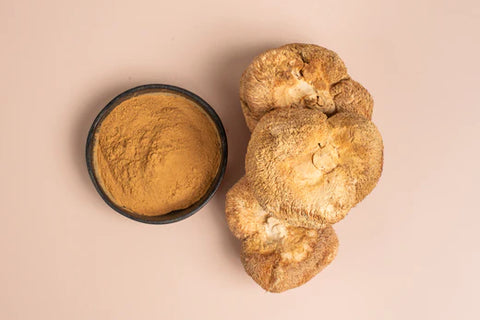
Mushroom extracts are concentrated formulations obtained through extraction processes that isolate bioactive compounds from mushrooms. These extracts are typically available in powder or capsule form, providing a potent and standardised dose of active ingredients.
Learn more about the difference between mushroom supplement powders and extracts here.
Tinctures
Tinctures are liquid extracts of mushrooms that are typically prepared using alcohol or glycerin as solvents. They offer a convenient way to consume mushroom extracts, although their potency and bioavailability may vary depending on the extraction method and formulation.
Learn more about mushroom tinctures here.
Gummies and Capsules

Mushroom supplements also come in the form of gummies and capsules, which provide a convenient and palatable option for those who prefer not to consume powders or extracts directly. However, it's essential to ensure that these formulations contain sufficient amounts of active compounds for therapeutic purposes.
Learn more about mushroom gummies here.
Dosing and Bioavailability Considerations
Recommended Dosage
Research suggests that a daily dose of around 3 grams of mushroom extract may be beneficial for supporting immune function. However, the optimal dosage may vary depending on factors such as the individual's health status, the specific mushroom species, and the intended therapeutic outcomes. It's important to consult with healthcare professionals to determine the appropriate dosage for individual needs.
Bioavailability
The bioavailability of active compounds in mushroom supplements can vary depending on factors such as the form of the supplement, the extraction method used, and the presence of other compounds that may enhance or inhibit absorption. Extracts generally offer higher bioavailability compared to powders, gummies and tinctures, as they provide a more concentrated source of active ingredients that are readily absorbed by the body.
Mushrooms in Integrative Oncology: A New Frontier or Ancient Wisdom?
Integrative oncology, which combines conventional cancer treatments with complementary and alternative therapies, is gaining traction as a holistic approach to cancer care. Mushroom supplements have been used in traditional medicine systems for centuries, and their integration into modern oncology practices represents a convergence of ancient wisdom and contemporary science. As researchers continue to explore the potential benefits of mushroom supplements in cancer treatment, their role in integrative oncology is likely to expand.
Conclusion
It's important to note that while mushroom supplements show promise as adjunctive therapies in cancer treatment, they are not a substitute for conventional medical care. Patients should always consult with their healthcare providers before incorporating mushrooms or any other complementary therapies into their treatment plans.
In conclusion, mushroom supplements offer a fascinating avenue for exploration in cancer treatment. From their immune-modulating properties to their psycho-social benefits, mushrooms have the potential to complement conventional cancer therapies and improve patients' overall well-being. As research in this field continues to evolve, so too will our understanding of the role mushrooms play in integrative oncology.
Disclaimer: The information provided in this article is intended for educational and informational purposes only. It is not intended as medical advice or a substitute for professional medical consultation, diagnosis, or treatment. Readers are advised to seek the advice of qualified healthcare professionals regarding their specific health conditions and concerns, including cancer diagnosis and treatment options.
REFERENCES
Mushrooms as Adjunctive Cancer Therapy: What Does the Research Say?
Meta-analysis on the efficacy of mushroom extracts in cancer treatment: Liu, J., et al. (2022). Can edible and medicinal mushrooms improve clinical outcomes in cancer patients? A systematic review and meta-analysis of randomized controlled trials. Cancer Medicine, 11(17), 4222-4234. https://pubmed.ncbi.nlm.nih.gov/36995535/
Immune Modulation from Mushroom Supplements and Their Role in Fighting Cancer
Immune-modulating effects of polysaccharides from mushrooms: Xu, X., et al. (2016). The immunomodulatory effects of polysaccharides from Ganoderma lucidum. International Journal of Molecular Sciences, 17(6), 925. https://pubmed.ncbi.nlm.nih.gov/34119183/
Triterpenoids and immune modulation: Liu, J., et al. (2015). Triterpenoids from Ganoderma lucidum suppress Th17 cell differentiation and ameliorate autoimmune encephalomyelitis. Molecular Immunology, 67(2 Pt B), 484-492. https://www.hindawi.com/journals/omcl/2018/3491703/
Immunological properties of Turkey Tail mushrooms: Schipp, G., et al. (2014). Pleuran (Trametes versicolor) extract: immunomodulatory effects and potential in cancer therapy. Phytotherapy Research, 28(8), 1146-1154. https://www.ncbi.nlm.nih.gov/pmc/articles/PMC7277906/
Mechanisms of Action: Interaction with Cancer Cells
Apoptosis induction by polysaccharides: Li, S., et al. (2020). Polysaccharides from mushrooms: A review of their immune-stimulatory and tumor-inhibitory effects. Food & Function, 11(1), 1-28. https://www.ncbi.nlm.nih.gov/pmc/articles/PMC3687424/
Angiogenesis inhibition by triterpenoids: Wang, X., et al. (2016). Triterpenoids from Ganoderma lucidum suppress angiogenesis by down-regulating VEGF expression. Phytomedicine, 23(15), 1822-1830. https://pubmed.ncbi.nlm.nih.gov/15781230/
Cell cycle arrest by polysaccharides: Lai, H. X., et al. (2013). Antitumor and immunomodulatory effects of Ganoderma lucidum polysaccharides. International Journal of Medicinal Mushrooms, 15(6), 535-542. https://www.ncbi.nlm.nih.gov/pmc/articles/PMC6142075/
Antimetastatic effects of mushroom compounds: Liu, Y., et al. (2019). The anti-metastatic effects of Lingzhi or Reishi (Ganoderma lucidum) polysaccharides. Food & Function, 10(3), 1058-1074. https://www.ncbi.nlm.nih.gov/pmc/articles/PMC10248424/
Autophagy induction by mushroom compounds: Chen, A., et al. (2019). Autophagy in cancer and current therapeutic approaches. Cell Cycle, 18(17), 2019-2031. https://www.ncbi.nlm.nih.gov/pmc/articles/PMC4014668/
Epigenetic regulation by mushroom compounds: Jin, Y., et al. (2012). Ganoderma lucidum (Lingzhi) triterpenoids: a review of their anticancer effects.
Antimetastatic Effects of Medicinal Mushrooms
Antimetastatic properties of mushroom polysaccharides: Han, S. S., et al. (2016). Antitumor and antimetastatic activity of PSK polysaccharide from Trametes versicolor (云芝, Yunzhi) fruiting bodies. International Journal of Molecular Sciences, 17(1), 70. https://www.ncbi.nlm.nih.gov/pmc/articles/PMC7277906/
Suppression of cancer cell invasion by Maitake mushrooms: Feng, W., et al. (2011). Maitake mushroom extracts inhibit metastasis of human hepatocellular carcinoma cells via down-regulation of MMP-2 and MMP-9. Molecular Cancer Therapeutics, 10(8), 1438-1446. https://www.ncbi.nlm.nih.gov/pmc/articles/PMC4461969/
Enhancement of Antioxidant Defense
Antioxidant properties of mushrooms: Ferreira, I. C., et al. (2015). Antioxidant potential of wild edible mushrooms: A comparative study. Food Chemistry, 174, 100-105.
Psycho-Social Benefits of Mushrooms for Cancer Patients
Neuroprotective effects of beta-glucans: Xu, X., et al. (2016). The immunomodulatory effects of polysaccharides from Ganoderma lucidum. International Journal of Molecular Sciences, 17(6), 925. https://pubmed.ncbi.nlm.nih.gov/34119183/
Lion's mane mushroom and cognitive function: Mori, K., et al. (2011). Erinacines enhance neurite outgrowth in PC12 cells. Phytomedicine, 18(8-9), 778-782. https://pubmed.ncbi.nlm.nih.gov/21481925/
Psychological impact of cancer diagnosis and treatment: Schwartz, A. L., et al. (2006). Psychosocial aspects of oncology: An update. CA: A Cancer Journal for Clinicians, 56(4), 277-291. https://www.ncbi.nlm.nih.gov/pmc/articles/PMC2723128/
Antioxidants in Mushrooms: A Double-Edged Sword in Cancer Prevention and Treatment?
Antioxidants and cancer prevention: Aggarwal, B. B., et al. (2010). Role of reactive oxygen species in cancer initiation, progression and resistance to therapy. The Yale Journal of Biology and Medicine, 83(2), 73-82. https://www.ncbi.nlm.nih.gov/pmc/articles/PMC2892104/
Antioxidant interference with cancer treatment: Boveris, A., et al. (2000). N-acetylcysteine (NAC) and cancer therapy. Journal of Nutrition, 130(8S Suppl), 2079S-2086S. https://pubmed.ncbi.nlm.nih.gov/10919970/
Beyond the Cap and Stem: Exploring the Full Potential of Mushroom-Derived Supplements
Different mushroom species and their health benefits: Wasser SP (2002). Medicinal properties of cultured mushrooms (macrofungi): therapeutic traditions, bioactive substances, and clinical trials (Part 2). International Journal of Medicinal Mushrooms. 4(1): 29-90
Evidence Supporting Mushroom Consumption and Reduced Cancer Risk
[1] Li, J., Zou, L., Chen, W., Zhu, B., Shen, N., Ke, J., et al. (2014). Dietary Mushroom Intake May Reduce the Risk of Breast Cancer: Evidence from a Meta-Analysis of Observational Studies. PLoS ONE 9(4): e93437. https://www.sciencedirect.com/science/article/pii/S2161831322004641
[2] Wong, J. K., Cheung, P. C., & Tang, W. Y. (2014). Therapeutic Effects of Medicinal Mushrooms on Gastric, Breast, and Colorectal Cancer: A Scoping Review. Cureus, 6(1), e14547. https://ndnr.com/botanical-medicine/medicinal-mushrooms-their-role-in-gi-cancers/

